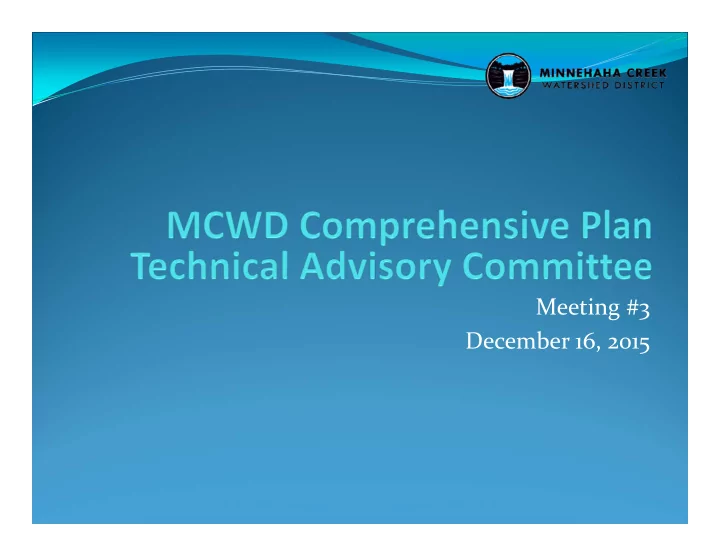

Meeting #3 December 16, 2015
Agenda Integration of land ‐ use and water planning: Connection of land ‐ use and water Historic disconnect MCWD efforts to integrate Two ‐ track approach Purpose Overview of 2 tracks Examples Committee discussion
BALANCED URBAN ECOLOGY: Bridging the Land-use THE EVOLUTION OF Water Governance Gap MCWD POLICY
OUTLINE: 1. Where did watershed districts come from? 2. Pitfalls of the MN watershed management framework. 3. Minnehaha Creek Watershed District’s evolution in policy and planning.
WHY WATERSHED DISTRICTS?
LAND-USE AND WATER
UPSTREAM - DOWNSTREAM NEIGHBORS
POTENTIAL FOR CONFLICT OF INTEREST
MINNESOTA WATERSHED ACT
MINNESOTA STATUTE CHAPTER 103D “To conserve the natural resources of the state by land-use planning, flood control, and other conservation projects by using sound scientific principles for the protection of the public health and welfare”
PITFALLS OF WATERSHED FRAMEWORK: UNINTENTIONAL SILOS?
A CALL FOR INTEGRATED PLANNING! 2007 Evaluation Report on Watershed Management (Legislative Auditor) 2009 Land and Water Policy Project (MEI) 2011 Water Governance Study (Hennepin County/Humphrey School) 2013 Water Regulation and Governance (MPCA)
WHY HAS INTEGRATION BEEN LACKING? 1. Desynchronized Planning 2. Cultural Differences 3. Reliance on Regulation
1. DESYNCHRONIZED PLANNING Collect Implement Data Diagnose Adoption Issues Watershed District Planning & 10 Year CIP Establish Implementation Plan Goals Public Engagement
2. CULTURAL DIFFERENCES? The Planner’s Triangle
3. REGULATION AS A SAFETY NET
MCWD POLICY HIGHLIGHTS October 2009 – Hennepin Community Works Model 2010 and 2011 – Louis Smith’s Watershed Partnerships Paper May 2013 – Board Retreat Discussion September 2013 – Policy Discussions for 2017 Plan March 2014 - Balanced Urban Ecology
CENTRAL THEME OF MCWD’S PLAN Help us be a partner!
Two ‐ Track Approach
Evolution of Two ‐ Track Approach Challenges with 2007 Plan: Static plan, out of sync with land ‐ use planning Overly prescriptive Spread resources too thin Successes in Minnehaha Creek Greenway: Integration/collaboration Focus Flexibility
2 Approaches to Partnering Focus Track Responsive Track High ‐ need area Partner initiates Large ‐ scale, complex Can leverage District issues resources: District leads/convenes Capital project requests Cost share grants Results in coordinated implementation/ Technical assistance investment plan Program support
Other Responsive Track Examples Capital projects: Programmatic support: Taft ‐ Legion Lake AIS management – Christmas Lake Meadowbrook/Hiawatha Excelsior – assistance with Long Lake WWTP MS4 requirements Highway 101 Causeway Cost share grants: Technical assistance: Edina – Arden Park Land conservation/ restoration – Painter Creek Mound road reconstruction Permitting ‐ Mader wetland Wayzata Bay Center Nokomis alleyways
Summary Goals of two ‐ track approach: Focus for greater effectiveness Flexibility to act on opportunities Improved integration with land ‐ use planning Keys to success: Requires early coordination District viewed as value ‐ added partner, not regulator
Discussion How can we improve integration of land ‐ use and water planning? How can we improve coordination to better track local plans and opportunities? Have you noticed a change in the District’s approach? How do you see this approach working in your community?
Next Steps Next meeting: Continue discussion on integration: Regulatory framework February 17 or 24 at 1:00 or 2:00
Recommend
More recommend